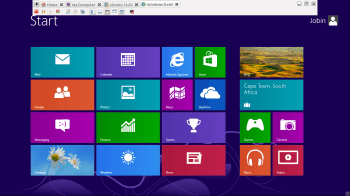Microsoft announcement has implications for your website
 Microsoft has announced the next version of its operating system, Windows, called “Windows 10” – yes they are missing out entirely a version numbered “9”. It is going to be another year before the product is available to consumers because more testing and development is required. But the announcement from Microsoft is revealing.
Microsoft has announced the next version of its operating system, Windows, called “Windows 10” – yes they are missing out entirely a version numbered “9”. It is going to be another year before the product is available to consumers because more testing and development is required. But the announcement from Microsoft is revealing.
One of the significant features is the presence of the “Start Button”. When Windows 8 was launched, the “Start Button” was removed in favour of a swiping screen full of “tiles”.
Why did Microsoft do this? Well, they argued that they needed a system that worked on mobile devices as well as PCs. They also appeared to be reasoning that everyone was going to convert to using touch screens and that the days of the keyboard were numbered. The tiles on Windows 8 were easy to swipe with your finger; the only problem was that most offices do not have touch screens. And even if they did, using them would need a wholesale shift in behaviour that is deeply embedded.
Windows 8 is used on less than one in five PCs. Hardly the success story that Microsoft had hoped for. Even Windows XP which the company no longer supports is used on almost twice as many computers.
It is all reminiscent of Windows Vista. That software has been named as one of the greatest technological flops of all time. Not only did it have severe hardware restrictions, causing people to upgrade PCs and peripherals costing lost of cash, but it also changed the way the PC interface worked. Windows 7 – still the most popular operating system – had to reverse the flaws of Vista, giving people back the kind of operating system they were used to.
You would have thought that Microsoft had learned its lesson. Clearly not. Here we are, eight years on from the Vista fiasco with Windows 10 clearly taking users back to something more familiar and user-friendly than Windows 8. Microsoft appears intent on change for change sake, but users are comfortable with the familiar.
Lesson for your website
This is an important lesson for your website. People prefer stability; they favour the familiar. When you try to change things, when you take away the comfortable, they do not like it. They want the past back.
This doesn’t mean you cannot introduce new things. But it does mean they have to run in familiar ways. The most successful apps on smartphones, for instance, all work in the same way. They have menus and settings in the same place. They use finger swipes in the same way. They don’t try to do things differently. Some do – we have probably never heard of them. People reject them.
Microsoft ought to have learned that the familiar is important to usability.
That is an important lesson for web design. If you try to change the familiar design of menus across the top, contact information at the bottom, and other standard design features you make your website less usable because it lacks familiarity. Designers will, like Microsoft, want you to be different. But different means unusable. Imagine if every car manufacturer in the world had different ways of steering the car. There is no need for a steering wheel – there are dozens of alternative ways of making the wheels turn. But it is the familiarity of the steering wheel that makes cars usable. We can get into any car in the world and use it.
You can’t get on to any PC in the world and use it because there is a one-in-five chance it will be running the tiled version of Windows 8 and you won’t know where to go or what to do. Windows 8 tried to change behaviour, which was its fundamental flaw.
If you use odd design on your website, you too are trying to change behaviour. It might mean that you have to put up with what you consider to be a boring website because it is “the same” as every other site. But it is this familiarity and “sameness” that makes it so usable. Far from trying to be different, the more you stay the same the better.
